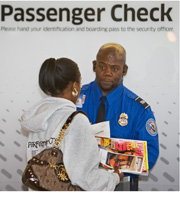Spotting a Liar
Bill Radke
Millie Jefferson
AUGUST 2, 2008
- TSA Officer
- (Paul J. Richards/AFP/Getty Images)
Web Resources
- Nick Morgan, Public Words
- Transportation Security Administration
- Airport Security Screening for Psychological Distress
Related Stories
- Foreclosure Double Punch
- The End of Weekend America
- Conversations with America: Concluding the Conversation
- Good News, Bad News, No News
More From Bill Radke
More From Millie Jefferson
Bill Radke: Nick Morgan, welcome to Weekend America.
Nick Morgan: Thank you, Bill.
Radke: There are a lot of popular conceptions about how to spot a liar: are they talking too fast; do they avert their eyes; did their hand go up to their mouth? How accurate are these popular ideas?
Morgan: Most of the standard things we think about, like not making eye contact or false smile, actually can be indications of lying. But most of us, as we grow up and become adults, we get pretty practiced at things like little white lies and perhaps even bigger lies. So we learn to squelch those things. Most of us are pretty good at avoiding the obvious dumb things like twitching eyes, or eyes darting all over the room that signal a lie. So what you have to look for are suppressed emotions, but there are plenty of people in this world that can you look you right in the eye and tell you a lie. So, those kinds of cliche indications of lying aren't terribly reliable.
Radke: How do the experts look for signs of nerves or deception?
Morgan: Basically, people try to maintain, and I'm assuming terrorists do the same, normal-looking facial expressions and a normal stance and walk. What you are looking for are little micro expressions, little expressions that come and go in the blink of an eye. You can be trained to see them, but mostly for the rest of us, if we're not trained we don't pick them up.
Radke: What are some of the most telling micro expressions?
Morgan: Here's where it starts to get more complicated. What the micro expressions might reveal are the underlying emotion, so it depends on what that underlying emotion is. For example, if you meet someone who gives you an insincere smile, and you are trained in reading micro expressions, then you might detect a sneer for a split-second under that smile. So it really depends on what the terrorist or the person who intends harm is feeling. I mean, for example, you might just be nervous about flying, and you might be trying to suppress that feeling of nervousness for all types of reasons. All we can really do is train people to recognize that there is an underlying emotion being suppressed to the best of this person's ability.







Comments
Comment | Refresh
Post a Comment: Please be civil, brief and relevant.
Email addresses are never displayed, but they are required to confirm your comments. All comments are moderated. Weekend America reserves the right to edit any comments on this site and to read them on the air if they are extra-interesting. Please read the Comment Guidelines before posting.
You must be 13 or over to submit information to American Public Media. The information entered into this form will not be used to send unsolicited email and will not be sold to a third party. For more information see Terms and Conditions and Privacy Policy.